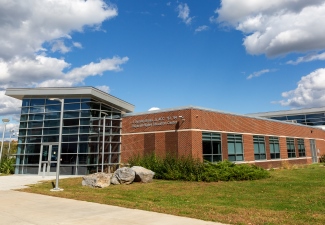Geography Institute to Feature Place-Based Learning
PLATTSBURGH, N.Y. (July 2, 2008) - SUNY Plattsburgh's Educational Services Departments and the North Country Teacher Resource Center are sponsoring a Geography Summer Institute for teachers in grades K-6 from July 7 to 11.
The theme for the institute is place-based education, an approach that emphasizes hands-on learning for students as they interact with their communities and world.
David Sobel, an expert on place-based learning, will be the keynote speaker. Sobel is co-director of the Center for Place-Based Education at Antioch University New England, the founder of the Harrisville Children's Center and co-director of CO-SEED, a collaboration with schools and their communities to work together to develop place-based learning. He is also the author of "Mapmaking with Children," "Place-Based Education: Connecting Classrooms and Communities" and "Childhood and Nature: Design Principles for Educators."
Sobel described the merits of the approach in his book, "Placed-Based Education: Connecting Classrooms and Communities," when he wrote, "Emphasizing hands-on, real-world learning experiences, this approach to education increases academic achievement, helps students develop stronger ties to their community, enhances students' appreciation for the natural world and creates a heightened commitment to serving as active contributing citizens."
The conference is part of SUNY Plattsburgh's effort to collaborate with area public schools, sharing resources and ultimately improving the quality of education for students in pre-school on up to college.
"Under P-16, there is a big state effort with the State University of New York, the Department of Education and the Regents to have universities and colleges, grades 13 through 16, work with schools that teach students from pre-school up into grade 12," said Dr. David Hill, dean of the education, health and human services at SUNY Plattsburgh.
The institute's target audience is elementary school teachers. However, in addition to helping those teachers to provide a rich educational experience for their students, the institute will ultimately help college students as well.
"The people who come to the institute are people who have been and/or will be hosting our students. By helping them, we are also helping our students," said Hill.
At present, they have 12 teachers from seven schools signed up to attend the institute.
"We've intentionally kept that number small, because we wanted to have an intimate group and because we've wanted to recruit select teachers who are experienced and committed to developing place-based educational strategies and applications," said Dr. Susan Mody, associate professor of childhood education, and one of the moving forces behind the institute.
In addition to Sobel's talk and workshop, the program will feature Barbara Napper, a teacher from Stafford Middle School, presenting information on helping students understand wetlands; Keene Central School Superintendent Cynthia Ford-Johnston and Bunny Goodwin, a master gardener, sharing their experiences running a composting and kitchen garden program in a school; and representatives from Cornell Cooperative Extension speaking about how to create links to agriculture in the community.
"Our goal is to frame this information for people so that they can take it back to the classroom," said Connie Marsh. The assistant director of field experience and student teaching, Marsh is playing an active role in preparing for the institute.
Not only do she and Mody hope that the teachers will take this information back to use it in their classrooms, they also hope that the teachers will form a support group, helping each other to use the information.
"One of the main outcomes that we hope for the institute is to create a network of people who will stay in touch with each other and support each other as they all go forward in creating these types of engagements for the students," added Mody.
Facilitating the growth of teachers and of students and linking them to the community and to each other is an important task for the college, according to Marsh.
"This is what the college's role ought to be," she said. "I am so thrilled with all of this."
For more information on the institute, contact Dr. Susan Mody at 518-564-5124, Kathy Fessette at 518-564-5002 or Connie Marsh at 518-564-5140.
News

SUNY Adirondack Students Benefit from New Dual Agreement with SUNY Plattsburgh Queensbury
